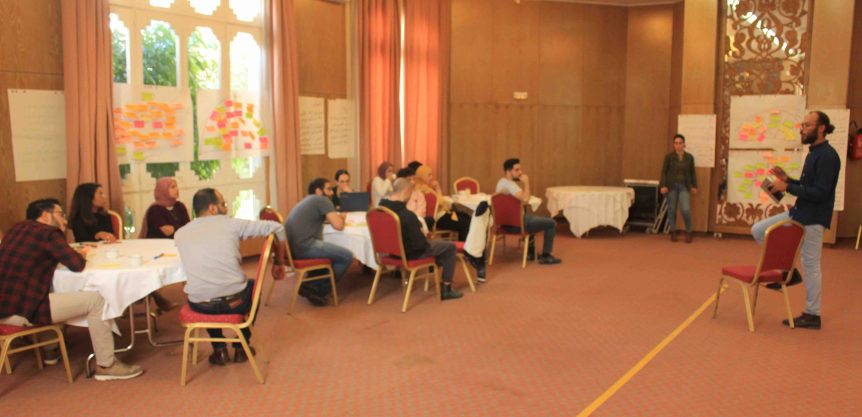In November 2019, the Human Rights Education Program at the Cairo Institute for Human Rights Studies held its third annual Young Leaders of Civil Society Program (YLCSP), a training symposium as part of its program for youth leaders of civil society in the Middle East and North Africa (MENA). Over nine days in two Tunisian cities, 15 human rights defenders from Iraq, Syria, Palestine, Egypt, Libya, Tunisia, and Morocco were brought together over nine days in two Tunisian cities as part of a training program based on a “participant-focused” learning process. This process is designed to accommodate participants of diverse interests and backgrounds and facilitate and the exchange of experiences. Participants’ professional specializations ranged from protecting women’s rights in armed conflict zones to freedom of expression, journalism, and media, the rights of sexual minorities, student activism, unemployment and precarious employment, and the rights of ethnic groups.— a broad array of issues reflecting their geographic diversity as well.
The symposium began with an introduction to the relationship between human rights, the state, religion, and the public sphere; focusing on the emergence and development of the rights movement and the challenges it faces in the MENA region. Participants discussed case studies depicting human rights issues, including the repression and violation of the personal liberties and individual rights of women, particularly women human rights defenders; as well as suppression of free expression and opinion, and systematic religious discrimination against minorities.
During the training, participants were divided into three main groups. The first focused on exploring how to combat sexual harassment in their work environment, while the second group examined the lack of criminal justice recourse for sexual minorities. The third group focused on indigenous rights in the region. In each group, participants applied advocacy strategies to their respective human rights issues, discussing the causes of the problem and its direct and indirect impacts, as well as the political, social, and religious factors behind the growth and spread of the problem. From there, each group identified objectives as part of a plan to address the problem, designed after identifying helpful and obstructive parties in the work environment and flexible tactics to bring change that is appropriate for the general context and nature of the problem.
Participants were able to take advantage of the experiences of Tunisian civil society actors involved in the training, particularly in debating and constructing arguments to confront societies hostile to human rights and freedoms, as well as how to use media and press platforms to raise awareness among the target public and resist counter-campaigns. The training was augmented by visiting the Tunisian Center for Press Freedom, which enabled participants to see up close how civil society in Tunisia functions and learn about the gains of and challenges facing media and rights work in the country today.
The Young Leaders of Civil Society Program included training on digital security and information safety, which are key to successful rights work in the region today given the repressive climate threatening the lives and safety of human rights defenders around the region. The training also provided a forum for CIHRS to share its experience with participants regarding international advocacy and UN human rights instruments. Part of the symposium focused on familiarizing participants with the UN grievance system and the nature and limits of UN special rapporteurs on particular rights. CIHRS stressed the importance of engaging with these and other instruments as part of international advocacy in order to bring redress to victims of human rights violations in states throughout the region, all of which are member states of the UN.
Share this Post

